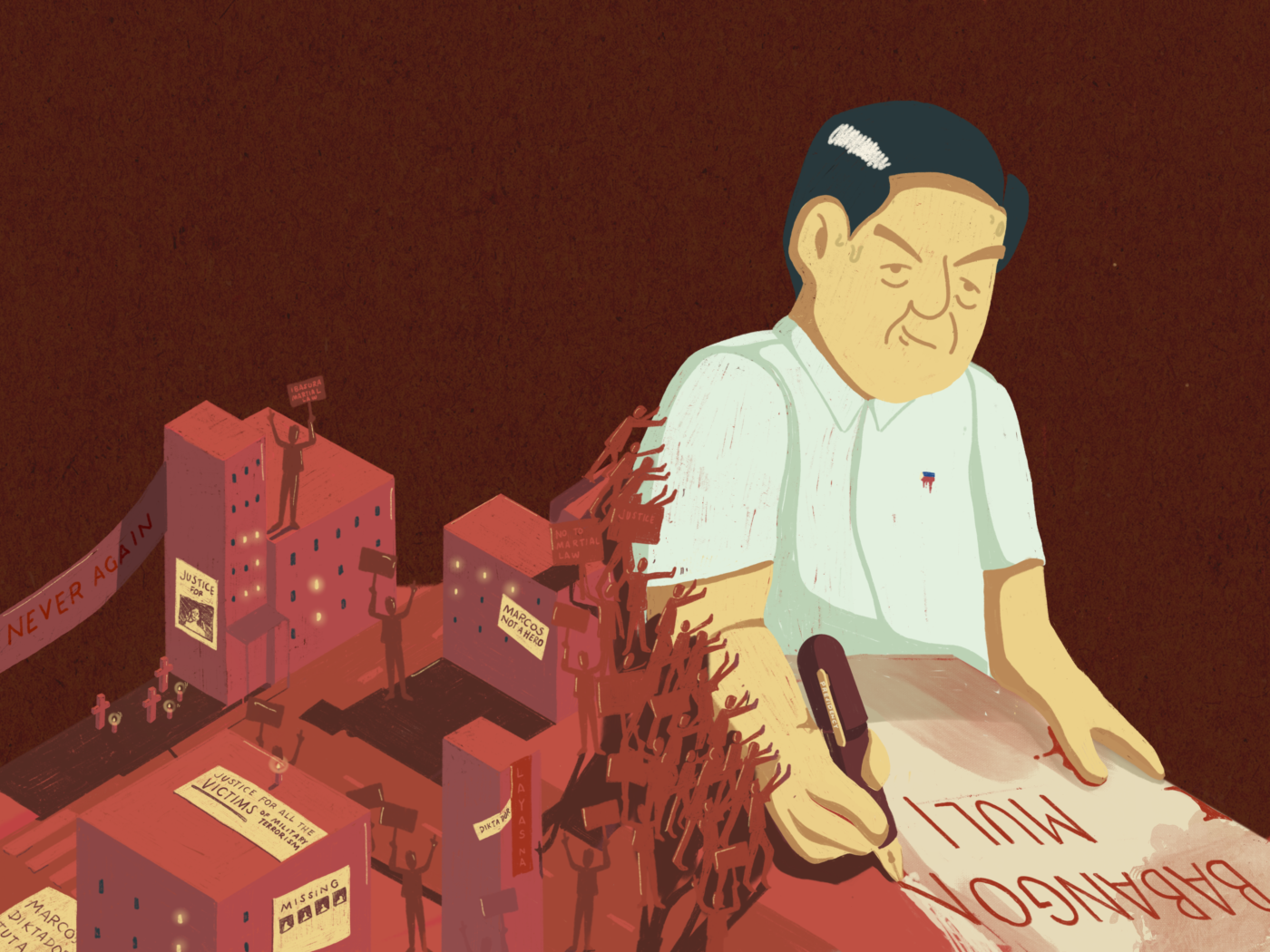AS PRESIDENT Ferdinand “Bongbong” Marcos Jr. walks the halls of Malacañang Palace, he must be more than content in knowing that the restoration of the Marcos family to the pinnacle of Philippine politics is complete. However, while Marcos Jr. has won the presidency on the backs of a convincing majority, the question still remains: Is Marcos Jr.’s presidency capable of erasing Martial Law narratives?
Regaining what was lost
When dictator and former President Marcos issued Proclamation No. 1081 in 1972, declaring martial law throughout the country, Marcos Jr. had just turned 15 years old.
His father declared Martial Law for the supposed reason of quelling the communist insurgency led by the Communist Party of the Philippines and its New People’s Army. Many political dissidents, opponents, suspected communist collaborators or sympathizers, and even regular Filipino citizens were thus imprisoned—all in the attempt to create Marcos’ “New Society.”
Included in this New Society were many of Marcos Sr.’s political allies, personal friends, and acquaintances who were then given positions of power and influence in the public and private spheres. This resulted in profound crony capitalism and corruption, crippling the Philippine’s economic growth throughout the period—all while the Marcos family and its cronies lined their pockets.
Marcos Jr. himself became Vice Governor of Ilocos Norte from 1981 to 1983, before assuming the position of Governor of Ilocos Norte from 1983 to 1986. Marcos Jr. was also Chairman of the Philippine Communications Satellite Corporation in 1985, where he was linked to the selling of government shares to Marcos cronies.
While the 1986 EDSA People Power Revolution put an end to Marcos Sr.’s despotic rule, the events that transpired afterwards only contributed to the return of the Marcoses to power. The decision that ultimately marked the beginning of the Marcos restoration was the return of Marcos Sr.’s remains to the Philippines in 1993. Unbeknownst to the public, this then would culminate in Marcos Sr.’s burial in the Libingan ng mga Bayani in 2016 under former President Rodrigo Duterte—thereby affording more legitimacy to the false notion of Marcos Sr. as a hero.
In 1993, a year after the Marcoses were allowed to return to the Philippines, former First Lady Imelda Marcos was convicted in Criminal Cases Number 17449, 17450, 17451, 17452, 17453. A January 1998 Supreme Court (SC) ruling later acquitted her of the charges placed against her in Criminal Case No. 17453, while another SC ruling in October 1998 acquitted her of the charges in Case No. 17450.
It would therefore be pointless to argue against the decisions of the Supreme Court. What is up for debate is the reality that the Marcoses benefited from the lengthy periods of time between legal proceedings, and the many years it took to resolve the cases and appeals involving them. For example, from 1992 to 1995—while Marcos Jr.’s mother faced the criminal cases placed before her—he was elected a representative for Ilocos Norte. In 1998, he became the province’s governor.
Even in light of the convictions upheld by Philippine courts, there has been a general lack of inaction from the government. A prime example of this is when Imelda Marcos was found guilty of graft in 2018, yet the Philippine National Police refused to arrest and detain her, citing her advanced age as a humanitarian consideration.
The Marcoses have remained powerful throughout decades of clandestine political moves, all stemming from their exile in 1986 and ending in their return to the highest seat in Malacañang in 2022.
Refusing the truth
Leading up to his election, Marcos Jr. repeatedly denied the facts surrounding his family’s history and actions during the Martial Law era and pushed forward new narratives. These false narratives perpetuated by the Marcoses often paint their family in a good light, simultaneously putting into doubt the lived experiences of those who fell prey to Marcos Sr.’s authoritarian policies.
For Marcos Jr., the domestic situation in 1972 concerning the country’s security was dire enough to warrant his father’s declaration of martial law. He argues that the country was left with no other choice but to defend itself from opponents of the government. Further, political allies of the current president have denied the occurrence of abuses and human rights violations during the Martial Law era, such as Atty. Larry Gadon, who ran under Marcos Jr.’s UniTeam senatorial slate.
While it is a subject that the president has exerted much effort to avoid in the past, Marcos Jr. has said that he could only apologize for his own wrongdoings and that he could not apologize on his father’s behalf. This tactic successfully deflected the topic of human rights abuses away from Marcos Jr., while simultaneously creating the idea that Marcos Jr. was not involved in his father’s 20-year rule.
Reforging a New Society
In the process of gaining back their political capital, the Marcos family has relegated to the sidelines the legal and social issues placed before them since their return in 1992. This would contribute to the emergence of a disillusioned Filipino people that would later elect Marcos Jr. to the presidency.
However, regardless of the power the family may amass, they will never be able to completely erase the shared history of Filipinos who suffered, resisted, and perished against their family in the past. This struggle has been an ongoing one, and the eyes of every Filipino will be trained on the president—as the people remain the supreme power of the nation. While Marcos Jr. may grace the halls of Malacañang today, the quiet quest for justice will define tomorrow.







